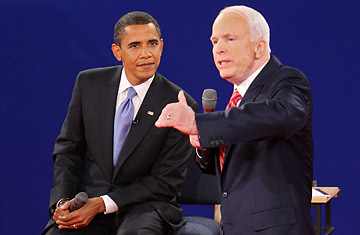
John McCain speaks during the debate with Barack Obama at Belmont University in Nashville, Tennessee.
There's no shot clock in presidential politics. Instead, it's like old-school basketball — if one side opens up a lead late in the game, they stall. Hang on to the ball. Don't take chances. Force the other side to take all the risks.
Barack Obama ran that classic, careful late-game offense Tuesday night in the second of three presidential debates this fall. Ahead in the polls, he was safe, cautious, disciplined and boring — and nothing John McCain attempted was enough to lure him into recklessness. By the end of the evening at Belmont University in Nashville, McCain was 90 minutes closer to running out of time.
This was the "town hall" debate — a format that generated a jolt of energy when it was first tried in 1992, but which is now as rote as piano scales. Candidates for junior class president no doubt know the basics: how to get up from your chair and walk gently toward the questioner; how to call her by name — first name only! (because you can relate); how to personalize your answer and strike the appropriate "I hurt because you're hurting" tone.
Format fatigue only helped Obama, because the town-hall-style debate doesn't feel dangerous anymore. No one is going to be caught checking his watch. No one will take the stage without memorizing the price of a gallon of milk and a gallon of gas. And because the campaigns ultimately set the rules, no audience member will be allowed to ask a question that hasn't been screened by some higher authority.
So viewers and the front runner all knew what to expect, and if you were watching closely you could see Obama's strategy from his very first answer. Of course the opening question concerned the meltdown of the financial markets. Moderator Tom Brokaw tried to get Obama to say how these events have reshaped his agenda. "The middle class need a rescue package," the candidate answered, which sounded new for a moment, until he opened the package to reveal exactly the same economic plan he has been running on for months.
Sure enough, McCain was the one forced to gamble by proposing something new: a government program to buy out and renegotiate the mortgages of defaulting homeowners. It was big. It was dramatic. But it wasn't very Republican. Somewhere, Ronald Reagan shuddered.
What are we to make of a debate in which the candidates agree on Warren Buffett for Secretary of the Treasury? Sounds great — but has anyone asked Warren? And in a race increasingly defined by economic issues, should McCain suggest that the best man to run the economy is a guy who has endorsed Obama?
McCain tried to rattle Obama. He talked about Obama's "cronies" behind the collapse of Freddie Mac and Fannie Mae. He jabbed a finger in Obama's direction and said "that one" voted for a pork-barrel energy bill.
But he never got his hands on the ball, and as basketball players know — the whole point of the stall — you can't score when the other side has the ball. "Look," Obama said at one point, "you're not interested in hearing politicians point fingers" — knowing that pointing fingers is a way for the trailing team to score.
The stall is characterized by long periods of boredom punctuated by brief flashes of drama. Late in the debate, Obama was killing time with a stern patch of bravado: "We will kill Bin Laden. We will crush al-Qaeda," and so on. How dead would that guy be by now if American speeches could kill a person?
When McCain's turn came, he leaped in with a table-turning attack. "My hero," McCain declared, is Theodore Roosevelt, who said, "Walk softly, and carry a big stick." He hinted that Obama is as reckless as, well, certain highly unpopular Presidents.
Obama seized the ball right back. To get control, he had to trample the rules, McCain and the moderator — and he did it all without breaking a sweat. By that point, both candidates had shredded the rules of engagement, despite Brokaw's limp protests. After a bit of verbal jostling, Obama was on his feet and in the clear, once again talking smoothly in his Muzak monotone. Brokaw mumbled sadly: "I'm just the hired help here."
"You're doing a great job, Tom," Obama replied.
What followed was Obama's sharpest answer of the night. "This is the guy who sang, 'Bomb, Bomb Iran,' " he said of McCain. "He called for the annihilation of North Korea ... That's not what I call walking softly."
The evening ended with an incongruous question plucked by Brokaw from thousands of online submissions: "What don't you know, and how will you learn it?" Obama took the mush as a signal to deliver his closing statement — a classic of the front-runner stall: when in doubt, praise the American Dream.
McCain was left with this: "When times are tough, we need a steady hand on the tiller."
He once thought the town-hall format was his friend. John McCain began the general election by challenging Obama to a long series of loosely structured town-hall debates. Ultimately, he got just one. And it ended with the clock ticking down to the buzzer.
(See Barack Obama's report card here.)
(See John McCain's report card here.)
(Click here to see the 10 Memorable Debate Moments.)
(See a gallery of campaign gaffes here.)
